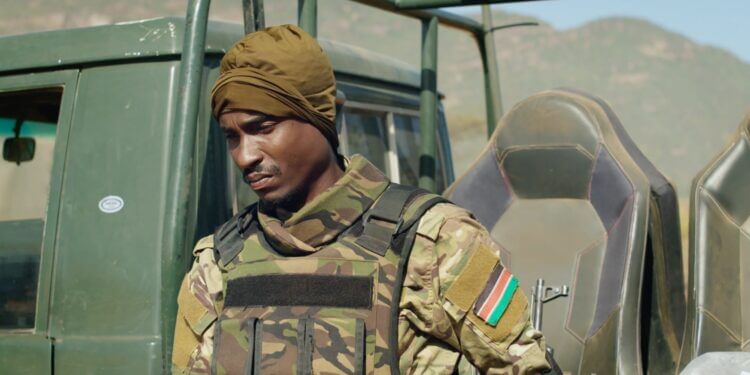Directed by Victor Gatonye under the Foxton Media banner, Mpakani tells ‘the story of the north’, Kenya’s arid region beset on all sides by dust and drought… and the occasional gunshots and terror. Thus, for ten weeks, KBC treated us to a season of Kenya’s first-ever military drama that followed one special unit team on the hunt for a dangerous terrorist named Burhaan (played by Bilal Mwaura, Uradi). The cast also includes George Mo (Pepeta), Claude Zatara (My Two Wives), Michael Munyoki (Single Kiasi), Brian Abajah (Second Family), Brenda Achieng (Crime and Justice), Emmanuel Mugo (County 49), and Benson Ochungo (Disconnect: The Wedding Planner).
Mpakani attempts, quite admirably, to paint portraits of each of its six main characters, showing us their video calls to home and the struggles they face serving their country. That last part is a decent sentiment, albeit a misguided one. More on that later.
It’s very apparent how much Mpakani is similar to M*A*S*H, the 70s American cult classic TV show inspired by another cult classic – the 1970 Robert Altman film of the same name. There, humour was the primary focus, negating not just a little but the whole plot to the sideline. I never really did see a frame of the TV show, but I’ve been, somewhat worryingly, a rabid rewatcher of the original misogynist howl of a movie. Mpakani‘s first episode shows potential for something on par as far as comedy is concerned, together with everything else. A lot of work and thought was clearly put into that episode. As the show develops, the thoughts and work seem to have gotten slimmer. That first episode is a very bad advertisement, though a very good foundation. Somehow, despite the clear degeneration of plot, Mpakani manages to hold one’s interest vaguely to the very end. It’s a new concept on Kenyan TV, too; it has that working for it.
Visually, one would be hard-pressed to see another program on network television that looks like this: dusty scenery, Kenyan military camo and hijabs. Speaking of hijabs, Mpakani treats its male Muslim characters like Germans in WWII movies, but only a little worse. In WWII movies, the German villains are largely faceless and mute and are accepted at face value as the ‘enemy’, ‘antagonist(s)’, or ‘bad’. In Mpakani, the writers opted to humanise their villains and attempt to make us, if not sympathise with their genocidal cause, understand it. Here, the villains are given big Shakespearean speeches rife with unintelligible philosophy that, ultimately, they come off as banally evil. That could’ve been the intent, and if it was, I say way too much screen time was dedicated to such a simple and trite conceit that could have been told in a much more succinct and quicker manner.
There are several drone shots, shots strapped to the side of tyres, and other dazzling pieces of cinematography. They would’ve scored extra points with this reviewer had these shots had any specific purpose to the story, but at least they were nice to look at. Although they were much nicer during Mpakani’s premiere on the big screen than during the proceedings weeks the show aired on KBC. The analogue versus digital war has already been won, and watching this on TV is like receiving signals from those long dead. This is where I shall review KBC as much as I review their show. But since I don’t know much about wavelengths or gizmo for that matter, I’ll keep it brief. KBC step up. You’re letting your own productions down.
In Mpakani, there’s also a lot of explosions and VFX work, specifically, with UI interfaces plastered on the screen – video chats, messages, and Kibet’s Sportpesa gag that runs past its finishing line and just keeps on running. It stops being funny after episode one. This simply doesn’t have the guts, the audacity or the comedic spontaneity of its influence M*A*S*H, and it’s painfully evident when they try. In Mpakani, it’s the comedy that’s sidelined, which is fine because they were clearly more interested in making an action thriller. The romances are even less developed than the humour. The problem I referred to earlier of their turbulent personal lives being put on display is that after a while, the illusion is lost. We don’t believe people who handle their personal lives that terribly, one an alcoholic and another a co-parent with the worst ex-boyfriend and another with both gambling and daddy issues, could be the best of the best, the most elite men and woman in our forces. It’s not only unsettling, it’s frankly unpatriotic.
Another anachronism is the CIA-like graphic screens that are in the headquarters. I’m not sure whether Kenyan intelligence agencies are funded that well but it struck me as odd. And even if it isn’t accurate (and my readers know accuracy means very little to me), it’s a sharp, jarring and sobering contrast when the team is on the ground, and we see Kenya for what it really is. All that tech in service of… this? The pop music the show uses in bits doesn’t seem to fit, and even though a lot of it is diegetic and reflects the actual sounds in the area, it still doesn’t work. Just because life can be anachronistic (as it can be both anything and everything) doesn’t mean the soundtrack should be as well. We’re not taking in life; we’re taking in a TV show.
Some of us may associate the locales of Mpakani with either Turkana, in which case the ‘Story of The North’ sub-title holds up, or the Eastern region of Kenya bordering Somalia, a known festering non-state for terrorists. There’s an episode in which the team chases down a vehicle suspected to be carrying a bomb maker. The Somali officials pull up and assume control across the border, and the disgruntled team have to head back. I’m assuming they couldn’t coin it: “The Story of North-Eastern.” It doesn’t sound right, and who’d watch a show by that title on KBC anyway?
The acting in this is serviceable. Nobody gives a big performance or reveals anything profound, nor did they, I suspect, have the opportunity to. Perhaps only the terrorist boss who goes on and on and on, bummer, I couldn’t understand a thing he was talking about.
Update: Mpakani is now available to stream on Netflix.
Enjoyed this article?
To receive the latest updates from Sinema Focus directly to your inbox, subscribe now.











